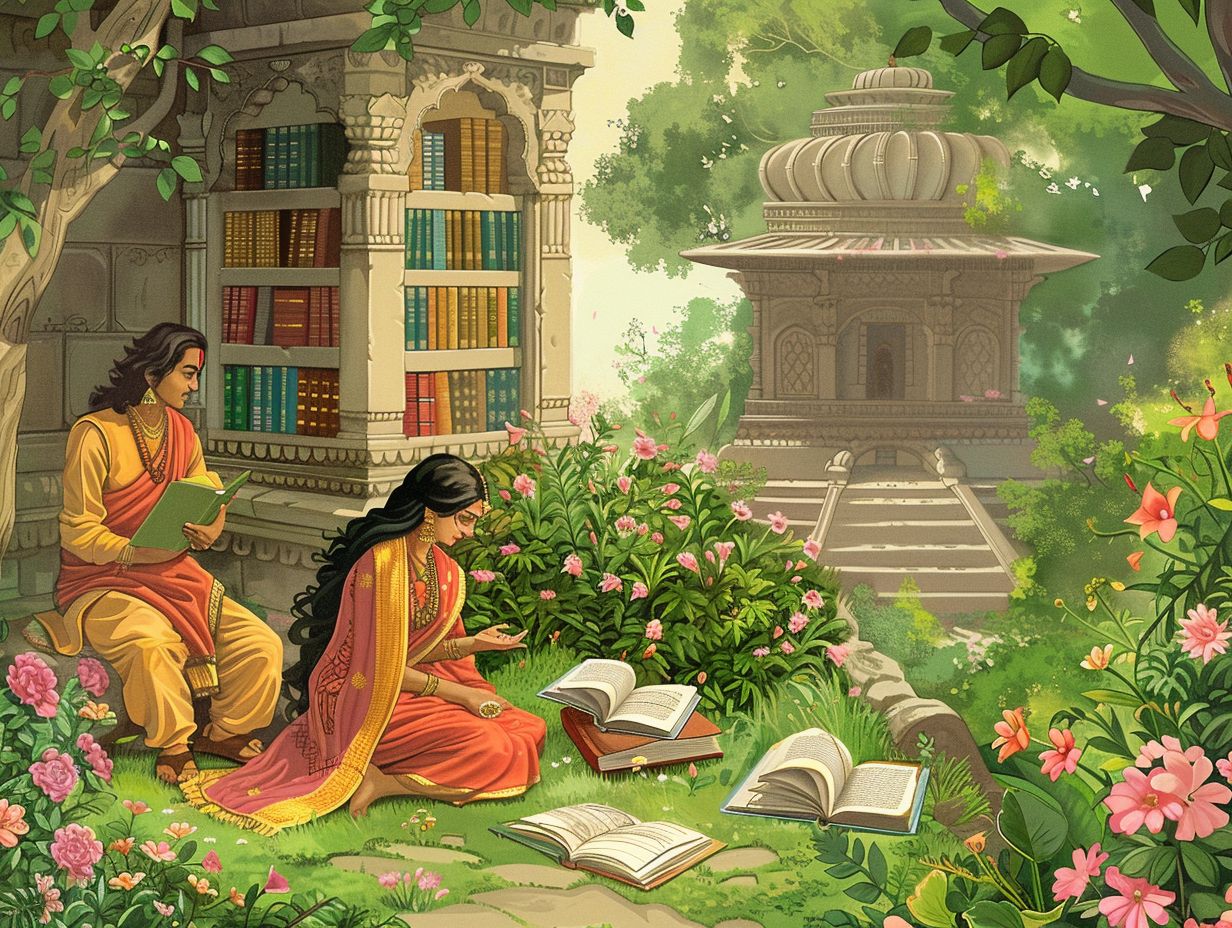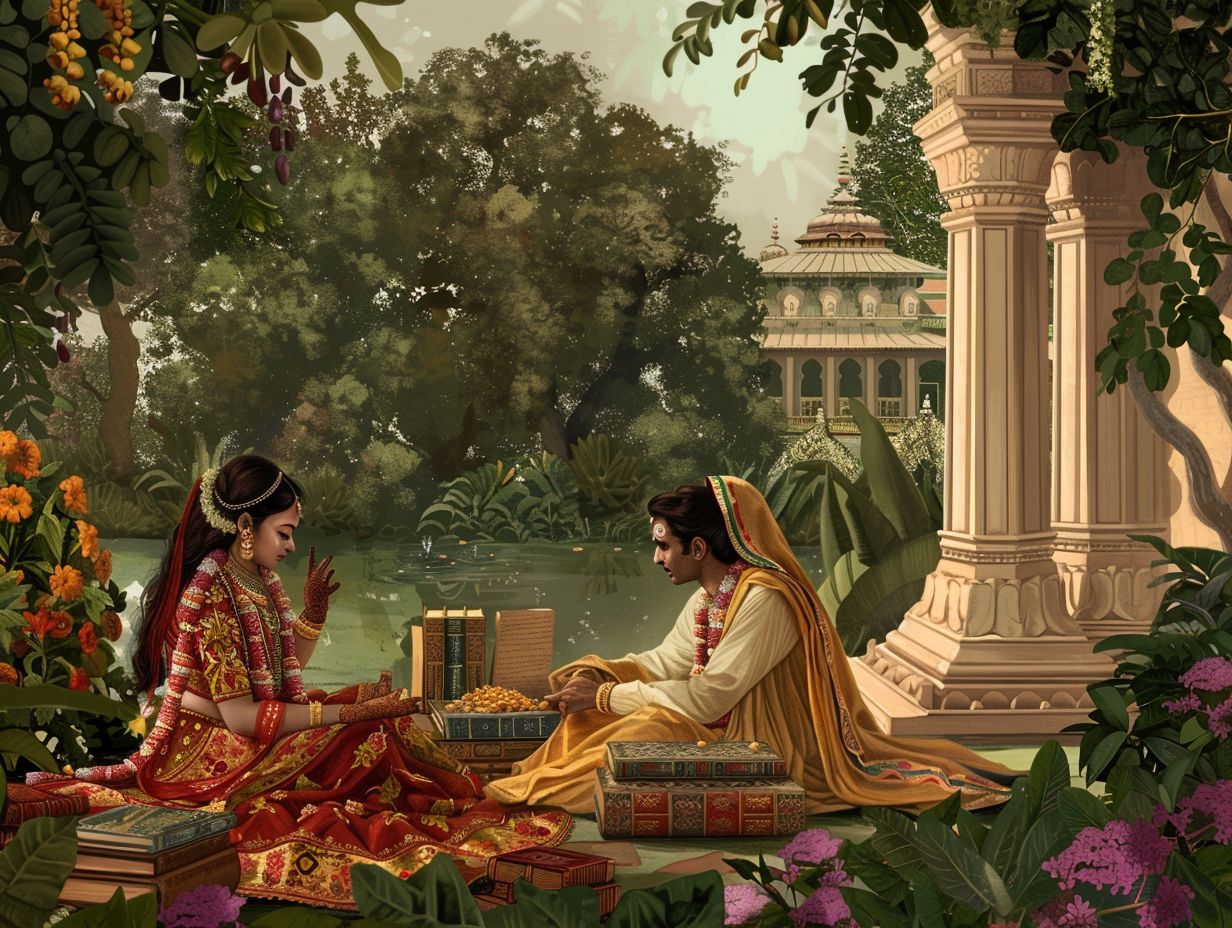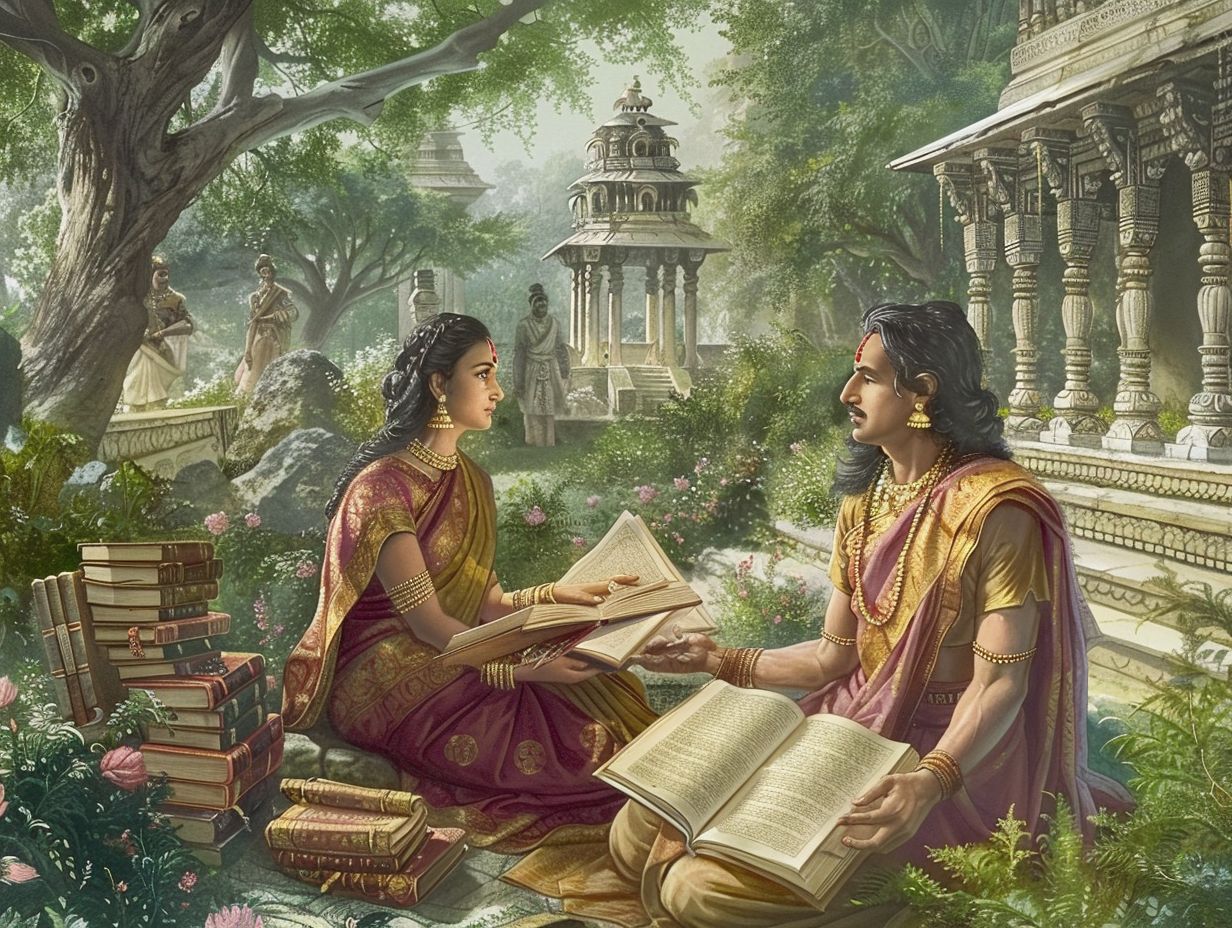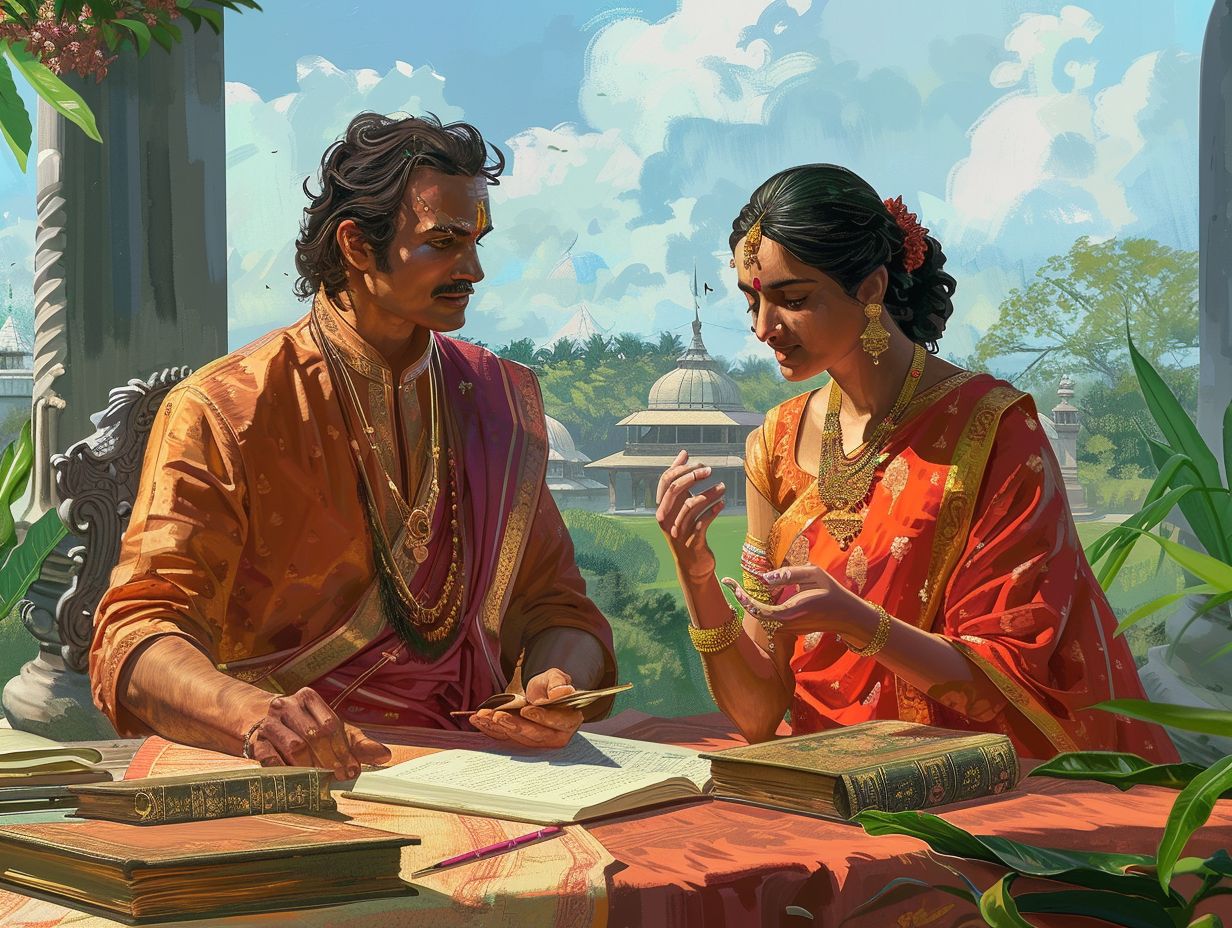Contributions of Kumaril Bhatta and Mandana Mishra
Kumaril Bhatta and Mandana Mishra emerge as monumental figures in the realm of Indian philosophy, each embodying distinct yet intricately connected strands of thought. Their lives and scholarly pursuits profoundly influenced the trajectory of philosophical discourse in ancient India, particularly through their seminal contributions to Mimamsa and Advaita Vedanta, respectively.
This exploration delves into their formative backgrounds, philosophical tenets, and the lasting impact they exerted on Indian thought. Furthermore, it scrutinizes the controversies that arose from their ideas, illustrating how their intellectual legacies continue to resonate in contemporary discussions.
The narrative invites an appreciation of the rich tapestry woven by their contributions to the philosophical landscape.
Who Were Kumaril Bhatta and Mandana Mishra?

Kumaril Bhatta and Mandana Mishra stand as seminal figures in Indian philosophy, their contributions profoundly shaping the landscape of ancient philosophical discourse. Representing two prominent schools of thought Mimamsa and Advaita Vedanta, respectively they engaged in thought-provoking debates that delved into epistemology, metaphysics, and the intricate nature of dharma.
Their dynamic as intellectual rivals and contemporaries is often emphasized in discussions surrounding the evolution of philosophical inquiry in India. Even today, their teachings and interpretations of Vedic texts resonate within various philosophical traditions, underscoring their lasting impact on the field.
Early Life and Background
Kumaril Bhatta and Mandana Mishra both emerged from rich cultural backgrounds that profoundly shaped their philosophical inquiries and teachings.
Kumaril, born into a Brahmin family deeply rooted in Vedic traditions, drew significant inspiration from the Upanishads and the concept of dharma, which guided him in navigating the ethical complexities of life. In contrast, Mandana was raised in an environment that emphasized the intricate relationship between logic and spirituality, fostering his critical thinking skills and his capacity to challenge established dogmas.
Their upbringing in such intellectually stimulating surroundings not only influenced their philosophical explorations but also set the stage for their intense debates regarding the nature of reality and the importance of knowledge. These discussions would ultimately leave an indelible mark on the landscape of Indian philosophy.
What Were Their Major Contributions?
Kumaril Bhatta’s contributions to Mimamsa philosophy and Mandana Mishra’s profound influence on Advaita Vedanta signify crucial milestones in the development of Indian philosophical thought. These scholars not only shaped their respective schools of thought but also engaged in a vibrant intellectual discourse that enriched the philosophical landscape of their time.
1. Kumaril Bhatta’s Contribution to Mimamsa Philosophy
Kumaril Bhatta is widely recognized for his authoritative contributions to Mimamsa, particularly highlighting the critical importance of ritual action and the nuanced interpretation of Vedic texts.
His principal works delve deeply into the philosophical foundations of dharma, demonstrating how ritual practices fundamentally shape ethical behavior and societal norms. Through a meticulous examination of Vedic scriptures, he presents compelling arguments that emphasize the essential role of these rituals in attaining both spiritual and material success.
His epistemological theories, especially those concerning perception and inference, challenge the interpretations put forth by rival philosophical schools, thereby reinforcing the significance of authority in the comprehension of sacred texts. In this discourse, the implications extend well beyond the rituals themselves, offering a comprehensive framework for navigating moral quandaries in everyday life.
2. Mandana Mishra’s Contribution to Advaita Vedanta
Mandana Mishra made remarkable advancements in Advaita Vedanta, eloquently articulating the intricate concepts of non-dualism and the nature of Brahman through his philosophical dialogues.
His seminal works, particularly the ‘Brahmasiddhi’ and the ‘Prakarana Granthas’, delve profoundly into the complexities of perception and reality, investigating how ignorance (avidya) obscures the authentic understanding of existence. By thoughtfully juxtaposing his arguments with those of his contemporaries, he established a dialectical method that significantly enriched the discourse surrounding self-identity and the ultimate unity of the universe.
These teachings not only deepened the comprehension of crucial concepts such as the relationship between atman (the individual soul) and Brahman (the ultimate reality) but also presented a pragmatic pathway to spiritual enlightenment. This approach has resonated through the ages, affirming Mandana Mishra’s enduring relevance in both historical and contemporary philosophical discussions.
What Were Their Beliefs and Philosophies?
The beliefs and philosophies of Kumaril Bhatta and Mandana Mishra delve into a spectrum of profound ontological and epistemological inquiries, revealing their distinct positions on the intricate dichotomy of dualism and non-dualism.
1. Kumaril Bhatta’s Beliefs

Kumaril Bhatta’s beliefs are firmly rooted in the assertion of dharma as the guiding principle for ethical action and the nuanced interpretation of Vedic texts. His philosophical arguments showcase a profound grasp of the intricate relationship between morality and knowledge, underscoring the notion that true understanding emerges from recognizing the paramount significance of dharma in human existence.
For Kumaril, dharma transcends a mere collection of rules; it is a dynamic force that shapes an individual’s purpose and actions, steering them toward a life defined by ethical integrity. This centrality of dharma significantly informs his epistemological perspective, positing that knowledge is most effectively acquired through a synthesis of scriptural authority and personal experience.
By articulating a vision that intertwines perception, knowledge, and ethical responsibility, Kumaril invites individuals to engage with the Vedic texts in a manner that promotes not only intellectual advancement but also spiritual growth. In doing so, he encourages a harmonious alignment of one’s actions with the greater cosmic order, enriching the journey of life with meaning and purpose.
2. Mandana Mishra’s Beliefs
Mandana Mishra’s beliefs are rooted in the profound concept of non-dualism, which underscores the unity of the self and Brahman within the philosophical framework of Advaita Vedanta. He conveys that reality transcends a mere assemblage of dualities; instead, it is a seamless existence where the individual soul is inherently linked to the universal consciousness.
His exploration of the self in relation to Brahman challenges the conventional distinctions that people often draw, prompting a reevaluation of their understanding of existence. The philosophical ramifications of non-dualism invite profound contemplation on the nature of perception, urging seekers to transcend illusion and recognize the intricate interconnectedness of all beings.
This perspective not only transforms the dialogue surrounding identity and spirituality but also emphasizes the significance of inner realization in comprehending the essence of universal truth.
How Did Their Contributions Impact Indian Philosophy?
The contributions of Kumaril Bhatta and Mandana Mishra have left an indelible mark on Indian philosophy, profoundly influencing numerous philosophical schools and shaping the intellectual legacy that future scholars would inherit.
Their profound insights and rigorous debates have enriched the philosophical landscape, ensuring their enduring relevance in the discourse of Indian thought.
1. Influence on Mimamsa and Advaita Vedanta Schools
The influence of Kumaril Bhatta on the Mimamsa school and Mandana Mishra on Advaita Vedanta is unmistakable, permeating their teachings and the subsequent philosophical discourse.
Both philosophers significantly shaped the foundational principles of their respective disciplines while also igniting critical dialogues that spurred further intellectual exploration. Kumaril Bhatta’s rigorous defense of ritualism and the epistemological tenets of Mimamsa prompted later scholars to delve into the intricacies of dharma and the interpretation of sacred texts.
In parallel, Mandana Mishra’s contributions to Advaita Vedanta established a framework for discussions on non-duality and the nature of reality, encouraging subsequent thinkers to refine and challenge his perspectives.
Through these evolving discussions, the rich tapestry of Indian philosophy continued to unfold, showcasing the dynamic interplay between tradition and innovation.
2. Influence on Other Philosophers and Scholars
The scholarly contributions of Kumaril Bhatta and Mandana Mishra have left an indelible mark, influencing not only their immediate philosophical schools but also a broader spectrum of philosophers and intellectuals throughout both ancient and modern contexts.
Their explorations of critical concepts such as validity (prama a) and the nature of reality continue to resonate within contemporary philosophy, fostering meaningful dialogues across diverse philosophical traditions. Kumaril s meticulous analysis of epistemology and Mandana’s compelling defense of non-dualism emerge as essential reference points for scholars endeavoring to navigate and reconcile Eastern and Western philosophies.
The philosophies of Kumaril and Mandana have ignited interest among modern thinkers who delve into themes of ethics, metaphysics, and the intricate interplay of faith and reason, thereby underscoring the enduring relevance of their ideas within today s intellectual landscape. This cross-cultural continuum not only enriches the discipline but also promotes an integrative approach to philosophical inquiry.
What Are Some Controversies Surrounding Their Contributions?
The contributions of Kumaril Bhatta and Mandana Mishra have sparked considerable controversy, especially in light of their debates with contemporaries such as Adi Shankara and other prominent philosophical figures.
1. Debate Between Kumaril Bhatta and Adi Shankara

The debate between Kumaril Bhatta and Adi Shankara stands as a significant philosophical confrontation between Mimamsa and Advaita Vedanta, illuminating their contrasting perspectives on the nature of reality and the self.
Kumaril Bhatta, a distinguished figure within the Mimamsa school, underscored the paramount importance of ritual and orthodoxy, positing that the ultimate purpose of life resides in the fulfillment of duties as delineated by the Vedas. His approach was firmly anchored in a rigorous hermeneutical analysis of scripture, emphasizing both the literal meanings and the practical application of rituals.
Conversely, Adi Shankara championed Advaita Vedanta, advocating for a non-dualistic interpretation of reality, wherein the individual self (Atman) is intrinsically identical to the ultimate reality (Brahman). His dialectical method, characterized by logical reasoning and metaphysical inquiry, culminated in the assertion that ignorance is the root of suffering, and that liberation is attained through the realization of this unity.
The ramifications of their disagreement resonate throughout subsequent philosophical discourse, shaping the thoughts of later thinkers and significantly contributing to the evolution of both ritualistic practices and metaphysical exploration within Indian philosophy.
2. Disagreement with Other Philosophers
Kumaril Bhatta and Mandana Mishra encountered significant disagreements with various philosophers and schools, which profoundly shaped their intellectual legacies.
These exchanges transcended mere academic disputes; they were deeply entrenched in the foundational beliefs that underpinned their respective philosophies. Bhatta, a steadfast advocate of the Mimamsa school, frequently engaged in spirited debates with Buddhist philosophers who challenged the authority of Vedic texts, advocating for a more empirical approach to truth. In contrast, Mishra, renowned for his deep engagement with Advaita Vedanta, navigated complex discussions with opponents who espoused differing epistemological views, questioning the very nature of reality and perception.
Such controversies not only refined their arguments but also played a pivotal role in defining their philosophical identities, fostering a rich dialogue that significantly enriched the intellectual landscape of India.
What Is Their Legacy Today?
The enduring legacy of Kumaril Bhatta and Mandana Mishra remains vibrant within contemporary Indian philosophy, where their profound teachings are both preserved and esteemed in both academic and spiritual realms.
1. Influence on Modern Indian Philosophy
The influence of Kumaril Bhatta and Mandana Mishra on modern Indian philosophy is undeniably profound, significantly shaping contemporary thought and scholarly discourse.
Their contributions, particularly in the fields of epistemology and metaphysics, resonate powerfully within current philosophical debates. Contemporary thinkers frequently engage with the principles of Mimamsa that these philosophers championed, exploring how their interpretations both challenge and reinforce various philosophical frameworks.
For example, one can observe the intricate nuances of Kumaril Bhatta s arguments regarding ritualistic practices, which find striking parallels in modern discussions on the relevance of tradition in an ever-evolving world. Similarly, Mandana Mishra’s dialogues concerning the nature of reality and knowledge continue to inspire vibrant conversations in both Eastern and Western philosophical circles, inviting new generations to wrestle with the complexities of existence and cognition.
2. Preservation of Their Works and Teachings
The preservation of Kumaril Bhatta and Mandana Mishra’s works ensures that their profound philosophical insights continue to inform and inspire future generations.
By employing various methods of preservation, including digitization and scholarly archiving, academic institutions play a pivotal role in safeguarding these significant texts for ongoing study. These endeavors not only aim to maintain the integrity of the original manuscripts but also to enhance accessibility for researchers and students alike.
Their writings, rich with intricate arguments on epistemology and ethics, offer invaluable contributions to contemporary philosophical debates. The involvement of scholars in curriculum development and instructional programs centered around these works underscores their importance in fostering critical thinking and promoting a deeper understanding of philosophical traditions, thereby nurturing a vibrant intellectual community.
Frequently Asked Questions
What are the major contributions of Kumaril Bhatta to Indian philosophy?

Kumaril Bhatta is known as one of the most influential Indian philosophers of the 7th century. His major contributions include the development of the Mimamsa school of Hindu philosophy and his commentary on the Mimamsa Sutras, known as the Shlokavartika. He also introduced the concept of apauru eyatva (authorlessness) in Vedas, which became a major tenet of the Mimamsa school.
What was the impact of Kumaril Bhatta’s contributions on Indian philosophy?
Kumaril Bhatta’s contributions had a significant impact on Indian philosophy as he revived the Mimamsa school, which was on the decline at that time. His commentary on the Mimamsa Sutras became the most authoritative text on the school’s philosophy, influencing other schools of thought as well.
What are some of the key contributions of Mandana Mishra to Indian philosophy?
Mandana Mishra was a renowned philosopher and theologian of the 8th century who made significant contributions to the Mimamsa school of thought. Some of his major contributions include the development of Mimamsa theories on epistemology, language, and logic. He also wrote commentaries on the Mimamsa Sutras and other Hindu scriptures.
How did Mandana Mishra’s contributions influence the development of Mimamsa school?
Mandana Mishra’s contributions played a crucial role in the development and revival of the Mimamsa school of philosophy. His commentaries and writings on various Mimamsa texts, along with his debates with other scholars, helped spread and solidify the school’s doctrines and principles.
What was the relationship between Kumaril Bhatta and Mandana Mishra?
Kumaril Bhatta and Mandana Mishra were contemporaries and colleagues who both played significant roles in the revival of the Mimamsa school. While they shared similar beliefs and principles, they also had some disagreements, which led to a famous philosophical debate between them that was eventually resolved through the intervention of Adi Shankara.
What is the significance of the contributions of Kumaril Bhatta and Mandana Mishra to Indian philosophy?
The contributions of Kumaril Bhatta and Mandana Mishra to Indian philosophy are of great significance as they helped revive and solidify the Mimamsa school, which played a crucial role in shaping the development of Hinduism. Their teachings and writings continue to have a lasting impact on Indian philosophical thought even today.
